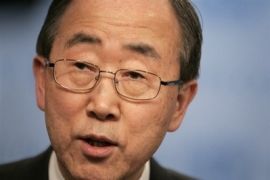UN chief says political process crucial to end Darfur crisis
April 4, 2008 (UNITED NATIONS) — The U.N. chief today said that security situation in the five year war-torn Darfur has deteriorated particularly in West Darfur. However the stressed on the need to accelerate the political settlement process to end this conflict.

Secretary-General Ban Ki-moon urged in a statement released on Friday with the presentation of his monthly report to the UN Security Council “all parties and stakeholders to immediately focus on the fundamental requirement for the protection of civilians and the establishment of sustainable peace and stability in Darfur.”
“A peacekeeping operation can be only effective when there is a peace to keep.” He further said.
Ban’s comments came after the U.S. presidential envoy for Darfur, Richard Williamson, sent him a letter urging him to speed up deployment of peacekeepers to Darfur and ensure that at least 3,600 new soldiers and police are there by June.
Ban Ki-Moon detailed in his 10 pages report to the Security Council the ongoing efforts to hasten the deployment of the 26000 hybrid peacekeeping force in Darfur.
He explained the delay by the ongoing Construction of the mission’s infrastructure which is hindered by the lack of sufficient military engineer units.
Also, he indicated that Sudanese government has still not provided UNAMID with the land it requires in El Geneina, Western Darfur. “This is already leading to logistical difficulties and will delay the deployment of troops and police to the area.” He added.
However he said that the remainder of the battalion will complete its deployment on 15 May.
More than that he disclosed that Sudan had given the green light for the deployment of the Thai infantry battalion and the Nepalese forces
“They will be deployed once the Egyptian and Ethiopian battalions have arrived in Darfur.” Ban wrote in his monthly report.
The international body had insisted on the critical need for an infantry battalion from Thailand and a Special Forces unit from Nepal because they will be used as rapid intervention troops.
Despite his insistence on the importance of the political process to end the conflict, Ban Ki-Moon contented himself with an appeal to “all parties involved to immediately abandon the path of military confrontation, commit themselves to the political process.”
He also said that Geneva meeting on 17 and 18 March held by the UN-AU envoys to Darfur with the regional initiative countries agreed that security is the current priority in Darfur, and stressed that all possible efforts must be made to improve the security environment, and to encourage the parties to put an end to the violence.
Ban Ki-Moon didn’t stop on the structure of the current joint mediation team and its future.
U.N. special envoy Jan Eliasson and his AU counterpart, Salim Ahmed Salim, whose joint leadership has come under fire, will soon be replaced by a single chief, said Sam Ibok, one of the veterans of Darfur peace mediation since Abuja.
In an effort to break the stalemate, future talks will focus on a short list of urgent issues, such as security, victim compensation and power-sharing, Ibok told the Los Angeles Times early this week.
International experts estimate around 2.5 million people have been displaced and 200,000 have died in five years of violence in Darfur which Washington calls genocide. Khartoum denies genocide and puts the death toll at 9,000.
(ST)
